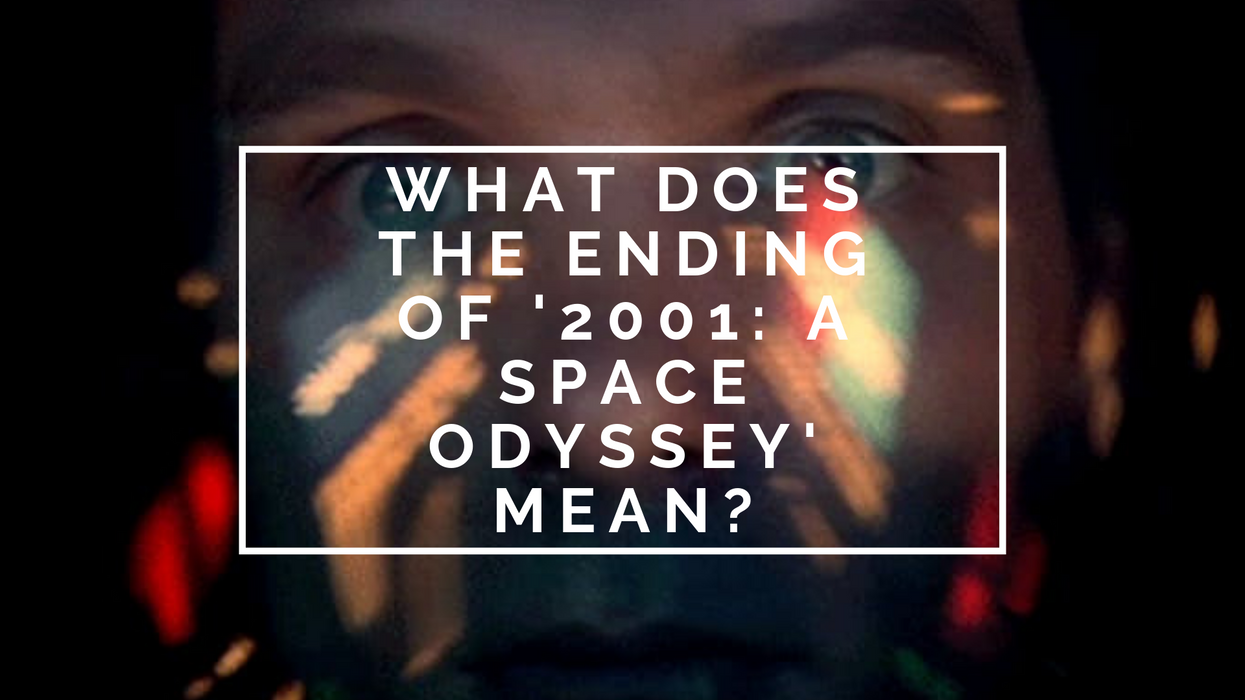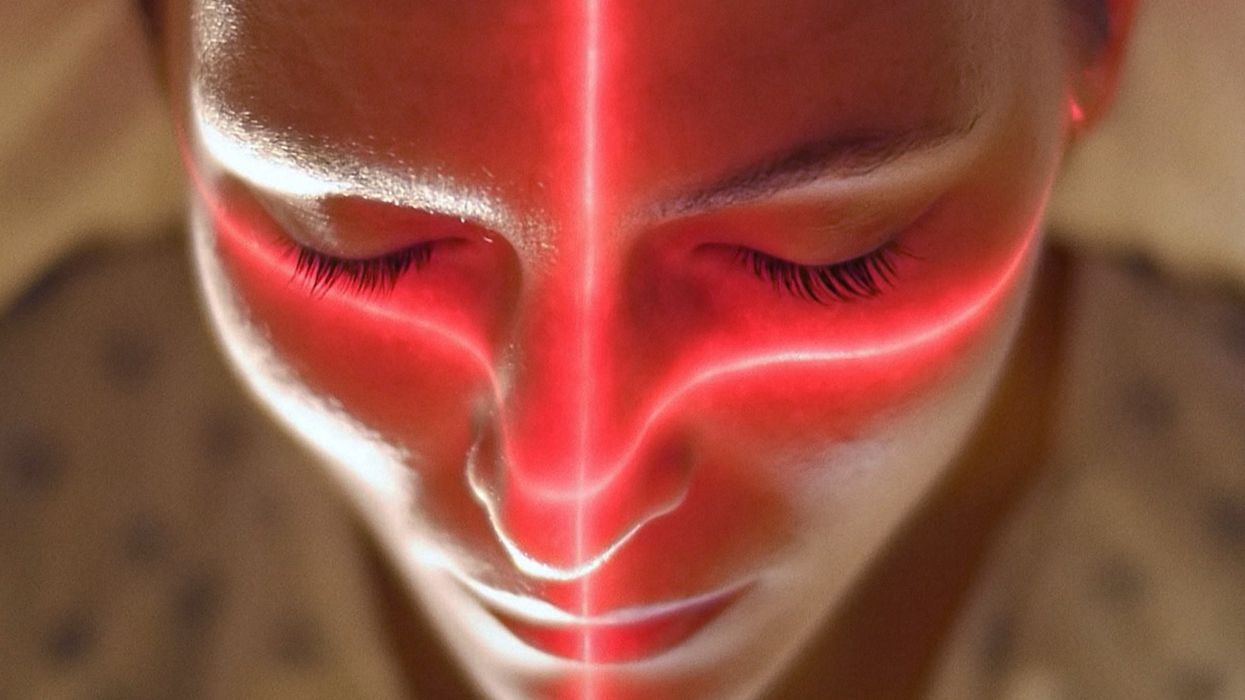What Does the Ending of '2001: A Space Odyssey' Mean?
The ending of '2001: A Space Odyssey' has fascinated audiences for years. Stanley Kubrick is an enigmatic director who put a lot of layers into all his work. Today, we're analyzing the themes, motifs, and talking about what actually happened.

Stanley Kubrick is a stunning filmmaker who challenges audiences at every level. He was famous for striking films with grand morals and questions. But when he released 2001: A Space Odyssey, it just was different.
Hollywood knew downer endings and ambiguous plot points, but for one of the first times ever, a mainstream movie asked an audience to chose an ending based on their own belief system.
It was deep, inspirational, and caused a lot of people to hate Stanley Kubrick.
People want answers. They want to know what to expect. What to believe. And the ending of 2001 was never going to give them that. But we might be able to help.
Today, we're going to go over 2001: A Space Odyssey. We'll talk about the beginning, the ending, and how you can walk away from a film like this one. I expect many to disagree and to have their own theories. Let's talk about them in the comments below.
But without further ado...let's talk about 2001: A Space Odyssey.
Someone throw me a bone!
Table of Contents
2001: A Space Odyssey
On April 5th, 1968, 2001 hit theaters. Kubrick was well known at the time for movies like Paths of Glory, Spartacus, and the adaptation of Vladimir Nabokov’s novel Lolita. His true fame came from the Nuclear satire Dr. Strangelove, or: How I Learned to Stop Worrying and Love the Bomb. That movie made Kubrick a household name and got him a meeting with Arthur C. Clarke. That meeting led to a collaboration by the men to adapt Clarke's short story “The Sentinel” into a screenplay as well as a full-length novel.
The original title for 2001 was going to be A Journey Beyond the Stars, but they went with 2001: A Space Odyssey. I think they did the switch because of how the end and beginning mirror one another, but more on that later.
The point is, we jump from the Pleistocene Era to a space-shuttle cabin some 4 million years later. Most people remember this magical match cut. It might be the greatest edit of all time.
The movie itself is around three hours long. There's an intermission. Only forty minutes contain dialogue. We have silence and an extensive score that shakes the theater when you see it on the big screen. Kubrick intended 2001 to be a visual experience and the lack of talking makes us take every frame in and ask for meaning.
When 2001 was released, The New Yorker’s Pauline Kael, for one, called it “monumentally unimaginative” but now we see Kubrick’s masterwork and one of the most significant films of the 20th century. At the 41st annual Academy Awards, the film did not receive a nomination for Best Picture, even though Kubrick was nominated for Best Director; he lost to Carol Reed for Oliver! 2001 won one Oscar for Best Visual Effects.
But it had an ending that people still talk about today.
The ending of 2001: A Space Odyssey
So what happens at the end of 2001?
After Dave and his crew head from the moon to Jupiter to investigate some mysterious monoliths, their computer system, HAL, takes over the ship. HAL kills everyone on board except Dave. Dave manages to survive, stumbles onto Jupiter, and encounters a species of highly advanced beings who try to give him the comforts of the good life. Dave, blown away by their existence, sees himself age in mere moments, goes on a color trail, dies, and is reborn as a star child.
That child jettisons toward earth.
And then the movie ends.
Huh?
The ending of 2001: A Space Odyssey Explained
We're now 18 years past 2001, we've never been to Jupiter, and the enigmatic ending of the movie still haunts the generations who watch it. There are many people who think 2001 is about the afterlife, or how nothing really matters. Still, some others say it's just Dave's fever dream as he runs out of oxygen on the planet.
So what does Kubrick say?
As you can tell, Kubrick didn't love giving answers. He says he avoided doing it because saying the ideas sound foolish, but dramatizing is about an experience. Kubrick goes on to describe the ending and talks about how Dave is basically placed in a zoo for humans by godlike aliens who study him until finished, then they transform him into a super being sent to Earth.
In a 1968 interview with Playboy, Kubrick stated:
"You're free to speculate as you wish about the philosophical and allegorical meaning of the film—and such speculation is one indication that it has succeeded in gripping the audience at a deep level—but I don't want to spell out a verbal road map for 2001 that every viewer will feel obligated to pursue or else fear he's missed the point."
When asked by Eric Nordern in Kubrick's interview with Playboy if 2001: A Space Odyssey was a religious film, Kubrick elaborated:
"I will say that the God concept is at the heart of 2001 but not any traditional, anthropomorphic image of God. I don't believe in any of Earth's monotheistic religions, but I do believe that one can construct an intriguing scientific definition of God, once you accept the fact that there are approximately 100 billion stars in our galaxy alone, that each star is a life-giving sun and that there are approximately 100 billion galaxies in just the visible universe. Given a planet in a stable orbit, not too hot and not too cold, and given a few billion years of chance chemical reactions created by the interaction of a sun's energy on the planet's chemicals,
While this is a nice explanation. It's not really what 2001 means. Sure, it might be what happens, but I think the meaning of the movie goes deeper than that.
Kubrick wants you to have a complicated answer to what the movie meant to you.
See, it doesn't matter what 2001 means to everyone. It matters what it means to you.
I'm not being a hippie about it, although I did write a post on here about happiness.
Think about it. In the beginning, the monkeys who find the monolith have no idea how to interpret it. Then, when we find one on the moon, we have no idea how to interpret that. In all that time, with all our advancements in technology, we still don't get it. And that's just like 2001.
What if the monoliths are just things to prod our personal beliefs about the lives we've lead?
As the colors cascade toward us, I think we're supposed to think about our lives, about what flashes before our eyes. Are there things you did wrong? Right? What parts do you wish were better?
Well, what if you could be better? What if you could leave 2001 born again, not a star baby ready to take on the rest of the earth with the empowering knowledge that you can change. That life isn't about understanding the monoliths before you but about loving the people around you.
Someday we'll be so advanced we'll understand the monoliths too.
But for now, we've got each other.
What's next? More Film Theory!
Tell me if this sounds familiar. It’s a Friday night, and you and your group of friends are exiting the movie theater. You saw a new release, and everyone is jockeying to get their opinion out. It can be hard to articulate the way you feel about a movie or TV show besides the typical "good" or "bad" gut reaction.
Sometimes you want to say more about a film or TV show.
Or maybe you want to write, direct or produce. It’s important to have a baseline of Film Theory so you can properly analyze what’s in front of you. To dissect a film and understand the context can take years of training. But you've been training without knowing it. Every time you watch a new show or movie you're building an internal database. You have something to base your reactions on and, over time, your tastes grow.
So click the link and find out more!












